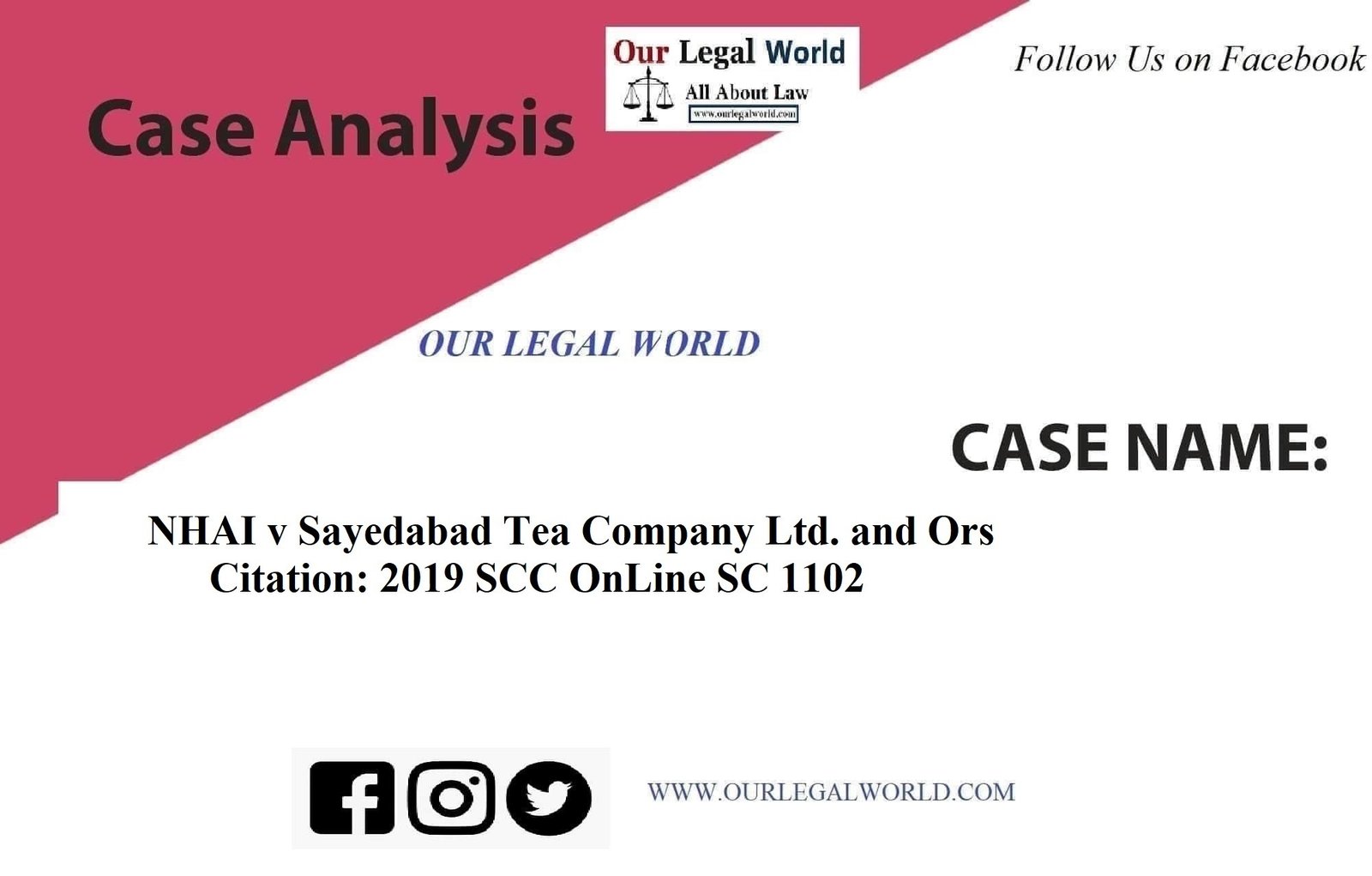NHAI v Sayedabad Tea Company Ltd. and Ors. – Case Analysis
Court: Supreme Court of India
Case: NHAI v Sayedabad Tea Company Ltd. and Ors.
Citation: 2019 SCC OnLine SC 1102
Appellant: National Highway Authority of India(NHAI)
Respondent: Sayedabad Tea Comp/any Ltd. and ors.
Bench: N.V. Ramana, Mohan M. Shantanagoudar, Ajay Rastogi.
Date of Judgement: 27 August,2019
Ratio: In view of the power being vested exclusively with the central government to appoint an arbitrator under Section 3G(5) of the NH Act, being a special enactment, the application filed under Section 11(6) of the Arbitration Act for appointment of an arbitrator was not maintainable and the provisions of the Arbitration Act could not be invoked for the purpose.
Relevant Facts: In the present case, the subject land comprises Sayedabad Tea Estate situated at Mouza Purba Madati, J.L. No. 108, Police Station Phansidewa, Dist. Darjeeling which was acquired by the appellant (National Highways Authority of India) in exercise of its powers under Section 3(D) of the Act 1956 under L.A.P. Case No. 4/2004−05 for the purpose of construction of the highways. The compensation was awarded by the appellant to the respondent under the National Highways Act, 1956 (NH Act).The respondent being dissatisfied with the award of compensation determined by the competent authority under sub−section(1) of Section 3G of the Act, 1956 filed an application for appointment of an Arbitrator in terms of Section 3G(5) to the Central Government on 8 th December, 2006.
The Central Government did not responded to the respondent request for appointment of an Arbitrator within a period of 30 days from receipt of the request.Therefore,the respondent filed an application on 7 th March, 2007 to the Chief Justice/his designate for appointment of an Arbitrator invoking Section 11(6) of the Act, 1996. On the request to the Central Government on 8th December,2006 by the respondent , the Arbitrator was appointed by the Central Government sometime in April 2007.
The sole Arbitrator was also appointed by the High Court of Calcutta pursuant to Order dated 6th July, 2007 under Section 11 of the Act, 1996 sent the letter of his recusal to the HC before initiation of the proceedings.The Arbitrator who was appointed by the Central Government under Section 3G(5) of the Act, 1956 in April, 2007 could not have proceeded after the intervention was made by the High Court of Calcutta in appointing the sole Arbitrator under Section 11(6) of the Act, 1996.
The HC of Calcutta passed an order dated 6th July, 2007 in favour of the respondent taking note of the fact that the Arbitrator has been appointed by the Central Government under Section 3G(5) of the Act, 1956 after the respondent had moved an application to the Chief Justice invoking its power under Section 11(6) of the Act, 1996 held that right of appointment of the Arbitrator by the Central Government stands forfeited as it failed to appoint the Arbitrator until filing of the application under Section 11(6) of the Act, 1996 before the High Court of Calcutta and appointment of Arbitrator during the pendency of proceedings, cannot be said to be a valid appointment.
Issue: Whether the application under Section 11 of the Arbitration and Conciliation Act, 1996 is maintainable in view of Section 3G(5) of the National Highways Act, 1956 ?
OR
Whether the mechanism for appointment of arbitrators in the Highways Act overrides the one present in the 1996 Act?
Analysis
Contentions of APPELLANT
1.The appellant moved an application for review after passing of order on 6th July,2007 and brought to the notice of the High Court that the Act, 1956 being a special enactment laying down a procedure for appointment of an Arbitrator where the power is being exclusively vested with the Central Government under Section 3G(5) of the Act, 1956, the application made under Section 11(6) of the Act, 1996 is not maintainable.
HC Judgment
The High Court did not consider the contention of the appellant to be a valid reason for invoking review jurisdiction by the High Court as envisaged under Order 47 Rule 1 read with Section 114 of Code of Civil Procedure and the review application was dismissed vide Order dated August 27, 2007. Aggrieved by the order of not exercising the review jurisdiction in favour of appellant, same has appeared before the Supreme Court.
2.The appellant submits that the Act 1956 being a special enactment is a code in itself provide for the mode of determining compensation by the competent authority and any person, if aggrieved by the compensation determined under sub− sections(1) or (2) of Section 3G of Act 1956 can certainly move an application for appointment of an Arbitrator to which a Central Government is under obligation to appoint under Section 3G(5) of the Act 1956.
3.Appellant alleged that before the matter could be proceeded, the respondent directly approached the High Court by filing an application under Section 11(6) of the Act 1996 which was not maintainable and this being the settled principles of law that the special law prevail over the general law, the provisions of Act 1996 could not have been invoked at least for the appointment of an Arbitrator in abrogating the power of the Central Government in appointing the Arbitrator as contemplated under Section 3G(5) of Act 1956.
4.The appellant contended that this being an apparent error in law committed by the High Court, the order passed by the High Court of Calcutta in the appointment of an Arbitrator under Section 11(6) of Act 1996 is not legally sustainable and both the Orders passed by the High Court, i.e. 6 th July,2007 and 27th August, 2007 deserves to be quashed and set aside.
The case on which the appellant placed reliance is National Highways and Infrastructure Development Corporation Ltd. Vs. Prakash Chand Pradhan & Ors.
National Highways and Infrastructure Development Corporation Ltd. Vs. Prakash Chand Pradhan & Ors. [1]
In this case, while dealing with the scope of sub−sections (5) and (6) of Section 3G of the Act 1956 with reference to Section 11 of the Act, 1996 ,the SC has held that the Act 1956 being a special enactment and Section 3G in particular provides an inbuilt mechanism for appointment of an Arbitrator by the Central Government. Hence it was held that Section 11 of the Act, 1996 has no application and the power is exclusively vested with the Central Government under Section 3G(5) of the Act, 1956 for appointment of an Arbitrator and if the Central Government does not appoint an Arbitrator within a reasonable time, it is open for the party to avail the remedy either by filing a writ petition under Article 226 of the Constitution of India or a suit for the purpose but the remedy of Section 11 of Act 1996 is not available for appointment of an Arbitrator.
Contentions of the Respondent:
The respondent supported the order passed by the High Court of Calcutta and contended that sub−section(6) of Section 3G clearly postulates that subject to the provisions of the Act 1956, the provisions of Act 1996 shall apply to every arbitration under the Act, 1956.
If the authority to whom application was filed for appointment of an Arbitrator under Section 3G(5) of Act, 1956 has failed to discharge its obligations within 30 days of presentation of the application or until filing of the application for appointment of an Arbitrator to the Chief Justice/his Designate under Section 11(6) of the Act, 1996 i.e. 7 th March, 2007, and thus the respondent was justified in taking recourse to sub−section(6) of Section 3G of Act, 1956 for appointment of an Arbitrator under Section 11(6) of Act, 1996.
Respondent submitted that the appellant under the Act, 1956 has forfeited its right to appoint an Arbitrator after presentation of the application under the Act, 1996 before the High Court of Calcutta and in the given circumstances, there was no legal impediment before the High Court of Calcutta in appointment of an Arbitrator invoking Section 11(6) of Act 1996.
The respondent supported his argument by relying on the judgment of the Supreme Court in Deep Trading Company Vs. Indian Oil Corporation and Others.
Deep Trading Company Vs. Indian Oil Corporation and Others. [2]
In this case, the Corporation has failed to act as required under the procedure agreed upon by the parties in Clause 29 and despite the demand by the dealer to appoint the arbitrator, the Corporation did not make an appointment until the application was made under Section 11(6). The court held in this case that the Corporation has forfeited its right of appointment of an arbitrator. It was held that the Chief Justice ought to have exercised his jurisdiction under Section 11(6) in the matter for appointment of an arbitrator appropriately. The appointment of the arbitrator by the Corporation during the pendency of proceedings under Section 11(6) was of no consequence.
Important Provisions
THE ARBITRATION AND CONCILIATION ACT, 1996
- Appointment of arbitrators.—
(6) Where, under an appointment procedure agreed upon by the parties,—
(a) a party fails to act as required under that procedure; or
(b) the parties, or the two appointed arbitrators, fail to reach an agreement expected of them under
that procedure; or
(c) a person, including an institution, fails to perform any function entrusted to him or it under that procedure,
a party may request [the Supreme Court or, as the case may be, the High Court or any person or institution designated by such Court] to take the necessary measure, unless the agreement on the appointment procedure provides other means for securing the appointment.
National Highways Act, 1956-
3G. Determination of amount payable as compensation.—
(1) Where any land is acquired under this Act, there shall be paid an amount which shall be determined by an order of the competent authority.
(2) Where the right of user or any right in the nature of an easement on, any land is acquired under this Act, there shall be paid an amount to the owner and any other person whose right of enjoyment in that land has been affected in any manner whatsoever by reason of such acquisition an amount calculated at ten per cent, of the amount determined under sub-section (1), for that land.
(5) If the amount determined by the competent authority under sub-section (1) or sub-section (2) is not acceptable to either of the parties, the amount shall, on an application by either of the parties, be determined by the arbitrator to be appointed by the Central Government.
(6) Subject to the provisions of this Act, the provisions of the Arbitration and Conciliation Act, 1996 (26 of 1996) shall apply to every arbitration under this Act.
3H. Deposit and payment of amount-
(5) Where the amount determined under section 3G by the arbitrator is in excess of the amount determined by the competent authority, the arbitrator may award interest at nine per cent, per annum on such excess amount from the date of taking possession under section 3D till the date of the actual deposit thereof.
SC Observations:
1.The Supreme Court observed that the usage of the term ‘subject to’ in Section 3G(5) of the NH Act clearly indicates that the provisions of the NH Act will have an overriding effect vis-a-vis the Arbitration Act in relation to land compensation matters arising under the NH Act.
2.The SC was in full agreement with the judgment “ National Highways and Infrastructure Development Corporation Ltd. Vs. Prakash Chand Pradhan & Ors.”
but further added that the NH Act, 1956 has been enacted under Entry 23 of the Union List of the Seventh Schedule of the Constitution with the exclusive power to legislate with respect to highways, which are declared to be national highways by or under law by the Parliament. It is a special enactment which provides an inbuilt mechanism not only in initiating acquisition until culmination of the proceedings in determining the compensation and its adjudication by the Arbitrator to be appointed by the Central Government and if still remain dissatisfied, by the Court of law.
The court assumed that the legislature intended the Act, 1956 to act as a complete code in itself for the purpose of acquisition until culmination including disbursement and for settlement of disputes and this conclusion is further strengthened in view of Section 3J of the Act which eliminates the application of the Land Acquisition Act, 1894, to an acquisition under the Act, 1956.
3.The Hon’ble Supreme Court observed that Section 3G(6) of the Act, 1956 clearly stipulates that the provisions of the Act, 1996 will apply subject to the provisions of the Act, 1956. The usage of the expression “subject to” clearly indicates that the legislature intended to give an overriding effect to the provisions of the Act, 1956 where it relates to the disputes pertaining to determination of the amount of compensation under the Act. The irresistible conclusion is that the legislature in its wisdom intended to abrogate the power for appointment of an Arbitrator under the provisions of the Act, 1996.
4.It is a well settled principle of law that when the special law sets out a self−contained code, the application of general law would impliedly be excluded.
5.The Court observed that right of appointment of an Arbitrator by the Central Government stands does not get forfeited within 30 days for the reason that there is no statutory limitation provided under sub−section (5) of Section 3G of Act 1956 for the Central Government to appoint an Arbitrator but that may not give an unguided discretion to the authority and in the absence of any statutory limitation, it must be within the reasonable time and if the Central Government fails in discharge of its statutory duty in appointing an Arbitrator on a request being made by either of the party aggrieved, it will be open to the party to invoke either the writ jurisdiction of the High Court under Article 226 of the Constitution of India or the Civil Court for the purpose.
Conclusion
1.The court concluded that as far as the appointment of an Arbitrator is concerned, the power being exclusively vested with the Central Government as envisaged under sub−section (5) of Section 3G of Act 1956, Section 11 of the Act 1996 has no application.
2.The SC ordered the Central Government to appoint an arbitrator and quashed orders passed by the High Court dated 6th July, 2007 and 27th August, 2007.
- The court ordered the Arbitrator so appointed by the Central Government to adjudicate and decide the dispute within a reasonable time.
Remark
It was in the case of Gujarat Urja Vikash Nigam Ltd. Vs. Essar Power Limited[3] where the issue arose before the Supreme Court was whether the application under Section 11(6) of the Act 1996 is maintainable in view of statutory provisions of Electricity Act, 2003 adjudicating the dispute between the licensee and the generating companies of the special enactment and Section 86(1) of the Electricity Act, 2003.The Supreme Court in this landmark case observed as under:−
Section 86(1)(f) is a special provision and hence will override the general provision in Section 11 of the Arbitration and Conciliation Act, 1996 for arbitration of disputes between the licensee and generating companies. It is a well settled principle of law that the special law overrides the general law. Hence the court held that Section 11 of the Arbitration and Conciliation Act, 1996 has no application to the question who can adjudicate/arbitrate disputes between licensees and 2 2008(4) SCC 755 generating companies, and only Section 86(1)(f) shall apply in such a situation.
[1]Civil Appeal No. 5250 of 2018 decided on 16 th May, 2018
[2]2013(4) SCC 35
[3] 2008(4) SCC 755
Edited By- Ankita Roy
Also Read: STRIDHAN: A STUDY ON WOMEN’S PROPERTY UNDER HINDU LAW




![Call for Campus Ambassadors by Our Legal World [2 Months; Virtual]: Apply by June 15](https://www.ourlegalworld.com/wp-content/uploads/2024/06/Logo-New-136x150.png)


